What Matters Now to past Justice head Emi Palmor: A stronger post-crisis Israel
A lecturer on government policy serving on Meta’s ‘Supreme Court,’ the 24-year Justice Ministry insider explains what needs to be fixed – but the cure isn’t the judicial overhaul
Welcome to What Matters Now, a weekly podcast exploration into one key issue shaping Israel and the Jewish World — right now.
This episode is being published during a uniquely Israeli window of time that occurs between Yom Hashoah — Holocaust Remembrance Day — and Yom Hazikaron — our Memorial Day for fallen soldiers.
This is a liminal space naturally inhabited by our What Matters Now guest this week, former director general of the Justice Ministry Emi Palmor.
A specialist in international human rights and government policy, she is the daughter of Holocaust survivors and — when not lecturing at law schools and leadership programs, or concentrating on her part-time work on the Facebook Oversight Board — she is also the volunteer head of Natal, an apolitical nonprofit organization that specializes in the field of war and terror-related trauma.
This week, headlines were again made about looming judicial overhaul legislation, this time regarding a potential legal counsel bill that would make legal advisers a discretionary role in ministries.
As she is a 24-year veteran of the Justice Ministry, with six years as its director general under several ministers from different parties, we ask Emi Palmor, What Matters Now.
The following transcript has been lightly edited.
The Times of Israel: Emi, thank you so much for joining me today.
Emi Palmor: It’s great to be here.
Such a pleasure to have you in our Jerusalem office. It’s been a very full week. We’ve had Yom HaShoah, we’ve had many other things, but we began this week with talk about the legal counsel bill. And so we’re going to drill down on this and many other aspects of your work and volunteer work. So I ask you this week, what matters now?
I think we cannot ignore the fact that we had the Holocaust Remembrance Day this week, and next week we have Independence Day and the Memorial Day for soldiers and victims of terror, because everything that we’re dealing with is dealing with the basics of the existence of Israel as the Jewish and democratic state that it is and that it is supposed to continue to be.
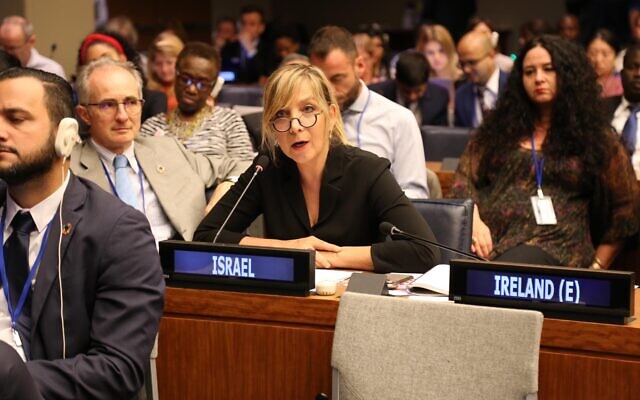
I think that the big picture has a lot to do with the analysis of what being a democracy means. I think that it’s interesting that a nation is looking again, trying to ask the big questions again, after 75 years of existence without a constitution. People in Israel like to say, oh, we have an elephant in the room. Well, I’m not sure it’s an elephant in the room. I think it’s big, big writing on all our walls. We have a very special political culture, definitely for the past five years or five elections.
Look, I was a civil servant since 1997, I was a prosecutor at the Supreme Court in the Criminal Division, I was the director of the Department of Pardons since the year 2000. I worked for 14 years with every minister of justice, and then I became the director general of the Ministry of Justice in 2014, and I lasted for almost six years, which is something that you cannot even dream about nowadays.
Under ministers from many different political parties as well.
I’m like the civil servant who proved that it’s possible to be director general, both with a minister like Tzipi Livni, who came from one party, which was at the time center-left wing. No, it was center. Nowadays, everything became left. Everything that is not Likud of [Prime Minister Benjamin] Netanyahu is left wing. And afterwards with Ayelet Shaked, who was definitely right-wing. She came from a party called, at the time, the Jewish Home.
And I found a way of bringing myself as a professional and as a person who was raised in the Ministry of Justice, not only a professional but with all the background of being part of this system. And it worked really, really well. But we cannot remember that anymore. And we cannot remember anymore that professionalism in the government is the important thing because everything our politicians want is to advance programs, ideas, agendas that are about the infrastructure of ruling and having this country going forward.
Let’s drill down a little bit into the buzz of the week, which is, of course, the legal counsel bill. Now, it seems to me — I’m not a lawyer and I wasn’t 24 years in the Justice Ministry like you — but the legal counsel is a way of having checks and balances within each ministry. And so the proposal is, as I understand it, that each minister will be able to hire, in a discretionary kind of way, his own legal counsel — and it could be from somebody who is not from the public sector, it can be a private lawyer — and fire this person at the same time. So tell me how it is now.
There is a term in the Israeli government that is called “positions of trust.” These are a few positions that politicians have the right to bring their own people to because that’s the logical thing to do. This is our system.
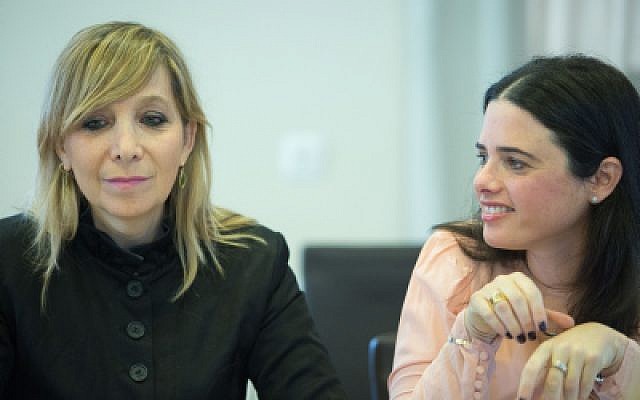
We have a professional — we have to say that as opposed to the US, for example — we have a professional civil service. People serve for 20, 30, 40 years. Of course, not in the same position, but moving around. And there are few positions of trust, which are positions that the minister is allowed to bring, first of all, the people in his own cabinet and then the director general.
This is why electing me at the time was very rare because usually, it’s a political person who is the director general. And definitely, definitely, the legal adviser is not supposed to be a position of trust. And this is part of the change that this bill wants to create. And I think that it’s a miserable bill, really. Usually, I don’t speak in such a way because it really has to do with a number of legal advisers that I know personally who are stuck in their positions for many, many years and are — just like you have all kinds of people when you employ a lot of people who are not the best, who are sometimes very conservative, or people are inefficient, you ask them to do something and they never do it. Or they have a certain aggressiveness…
Bureaucracy.
Yes and because of that and because of the bad experience of a few politicians from the Likud who was ruling Israel for the past 20 years, back and forth, so they had a lot of experience with these people. You create a bill that is really going to ruin the concept of a legal adviser who is really supposed to bring the checks and balances. And most of the time, and many of them are like that, really find the best solutions to both obey the law and promote the specific programs, agendas, whatever, bills that the ministers want. I think that the irony is that two ministers who were deep, deep, deep involved in advancing those ideas back in 2015, 2016 and 2017, were Ayelet Shaked, the minister of justice, and Yariv Levin, who at the time was the minister of tourism. And they had a team together. Both of them were practically in love with the legal advisers that they had in their own ministries. But they had this agenda that legal advisers should be personal nominations and trust positions. And you couldn’t confuse them with reality.
And the reality is you have good people, you have bad people. Learn how to deal, learn how to manage. But this goes back to what I said as our political culture. When you have bad nominations, for example, for director generals, and we saw that — I really don’t want to get too personal — but you see how the standards are lowering and lowering and lowering. You have people who really don’t know how to manage a large staff and how to deal with complex situations that everyone who has a company or has a ministry knows how to deal with. And I remember myself as a director general because I was trained as a director in the service over the years. I came with a lot of capabilities, and one of the ministers — I won’t say which — from the Likud, told Ayelet Shaked: maybe you can lend me Emi because I have this issue with the legal adviser of my ministry, and my director general doesn’t know how to deal with it. So maybe she can talk to her and she can give her feedback, and maybe she can convince her that it’s about time that she will retire. She’s already 20 years in the same position.
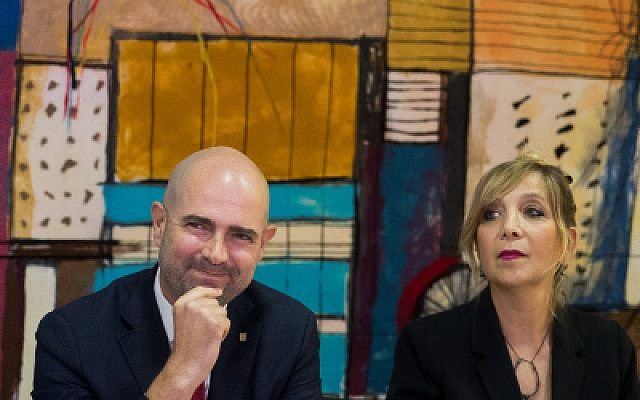
So when you know the truth from within, you know that it has nothing to do with the principles of the rule of law. And I don’t know how you say it in English, the word meshilut, governance? This buzzword, “governance.” You find out that the ministers and the politicians love to talk about this. But when you have to walk the talk, when you really have to do the work, when you really have to build all the teams that you need in order to work, in order to govern, they prefer to bring someone that they owe something to or that he will be faithful. Okay, faithful is important, but what else? So this is part of the problem.
Okay, so you obviously think that there are problems in the current system. And I wonder if you have any ideas how to solve these problems, because why should somebody be forced to work with somebody that they don’t have chemistry with?
We don’t have a system of “chemistry.” I think we have a very, very big problem of supervision, of training, of setting standards, of giving feedback, of — really I mean, I call that management. And management is much more than just hiring people, firing people, setting the programs for the ministry for the next five years and so forth. It’s super important, but really, it has to do with the fact that when you don’t do those things, you have an inefficient system. And when I look, for example, at our judicial system, when I look at the courts in Israel, I see tons of problems, none of them is being dealt with by our minister of justice or our government right now.
The system is inefficient. Nobody really supervises, nobody really asks the basic question of how long does it take to have your case in the lower magistrate courts? And when the whole system is neglected because the entire time our politicians are busy with the Supreme Court and dealing with the constitutional issues, some of the lack of trust towards the system has to do with really boring daily matters that you and I find when we have a traffic fine or something, and we want to go to the magistrate courts, when you have a small business and you have a problem with someone who didn’t pay you, when you have a dispute, a commercial dispute, nobody cares about this.
And then they tell us, no, the people don’t trust the judicial system. The people have no idea what is really happening in the Supreme Court. I mean, sometimes, yes, and especially if you brainwash them on a daily basis and tell them how the Supreme Court justices are against them and so forth.

Nobody comes and brainwashes you how the Supreme Court enabled women in Israel to do so many things that they couldn’t do before, or how the Supreme Court kept the religious rights of people across the country and across the religions who are living in this country, or how the Supreme Court protected gay rights in Israel.
So it’s really a lot about the awareness of the public to those issues that gives legitimacy to this overhaul. And it doesn’t, because when the time came — and this is really unbelievable that so many people were willing to protect the judicial system in Israel. You know what? Sometimes I say to myself, I’m not sure that people understand so deeply what it means as they are capable of noticing that the political culture is so crazy. I’m sorry, really, it’s turning so self-centered with the political needs of our politicians, which are important, but they cannot be the only thing that a government deals with.
I think if you have to explain what happened here in the past few months, I think it’s the notion that power can be unlimited and it’s just a matter — especially because we went through five elections — it is a coincidence who becomes the one holding the wheel. And you can have a party of six mandates like Naftali Bennett, and you become prime minister. It was just absurd. You can be happy that it’s a government that is composed of right-wing and left-wing and it has a certain type of hope that it gives, but you still see the absurdity that a person who doesn’t have a wide legitimacy can become prime minister.
And this has to do with the fact that the Basic Law of the government was turned around by the previous government, by Netanyahu and [Blue and White head Benny] Gantz in order to enable a coalition where both of them are prime minister. One is the first one and the other one is waiting on the sidelines. And this absurd thing just passed like this. It’s a Basic Law. When you have a constitution, you can’t just pass those laws like this just because it’s convenient at a certain moment.
So I think that what is happening now maybe will give us a better next 75 years.
Wow. Okay.
Hopefully! I’m an optimist and I’m not optimistic these days, but when it comes to really looking forward, I want to believe that we will end up stronger as a nation from this unbelievable crisis. And it is an unbelievable crisis.
I’ve been sad in these past three months, more than I can even describe, because I see what is happening and I also see how it is really ruining, as it is right now, it is ruining the solidarity that we were so proud of for decades. That what it means to be Israeli, it means that you live in a place where there is a special type of solidarity, special type of security that you will not be endangered ever by your people.

So much to unpack here. I would like to ask you many things about everything you said, but one point you made is that these Basic Laws are being made so quickly and so easily. Can they not be unmade the same way?
Yes, I think this is part of the problem. I mean, a Basic Law should be strengthened. This is one of the things also, that we heard on the news this morning and they were talking about one solution that says that the Supreme Court will be unable to deal with the Basic Laws. But to legislate a Basic Law is going to become much, much harder and will need a wider consensus. And I think that that could be a good balance between the two issues.
By the way, it’s not only the Basic Laws. I don’t have the figures right now with me, but the percentage of legislation in Israel is crazy compared to other places. I mean, every member of parliament thinks that what he has to do is to try to legislate and to put bills and so forth, and much less do what should be done by the parliament, which is to supervise the work of the parliament. This is also one of the issues of the separation of powers in Israel, which are not really separated, and the parliament doesn’t really supervise the government as it should, which is much needed.
By the way, this is the type of supervision, for example, that the judicial system doesn’t receive on an everyday basis. I mean, those basic questions about efficiency, about clarity, about all kind of things, about transparency, by the way, issues that can bring us to talk about the [Meta] oversight board, because the issues of do you trust the system nowadays have a lot to do with the transparency has a lot to do.
By the way, we didn’t say a word about this, but I worked a lot during my days at director general on issues of diversity. And I truly believe that this issue, I think it’s being politicized. But diversity is important. Diversity in the judicial system is important, but we’re living in the world of post-truth.
Let’s blame social media. So you can see serious people saying, “It’s unbelievable! There is not even one judge in the Supreme Court who is of Moroccan origin.” Well, there is, but maybe it’s not enough, but let’s not say that there isn’t. But people don’t know what the facts are, and the facts are really accessible. You can Google and see the names and backgrounds of our Supreme Court justices, but nobody does that. And it’s enough that you have an influencer on social media. You can say whatever you want. Nobody really does the fact-checking.
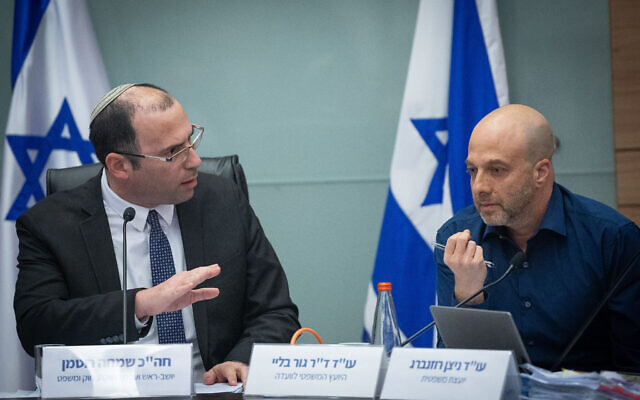
Except you. But before we turn to that, I just want to make sure I summarize very quickly some of the points that you raised. It sounds like you’re saying that the system, the judicial system, and the Justice Ministry and all other bureaucracies, in terms of their legal advisers — it is not a perfect system. It needs a lot of work in terms of training and oversight and management. And the ministers in general are tending to hope at least to surround themselves with “yes men,” which as politicians, they often do anyway, and that they too don’t have the managerial skills to continue with putting forth a professional program in order to actually make our bureaucracy work. So that’s one subject.
Now, let’s turn to Facebook or Meta, I guess they’re calling themselves now, the Facebook Oversight Board. You are one of…
Twenty-two now. We started at 20, one of our co-chairs stepped down, and we just nominated three new members. Maybe we’re 23 already, I’m not sure.
And I think the goal is 26, if I’m not mistaken?
Right.
And you just started a second term on this Oversight Board. First of all, how did you get involved in this? You have no social media footprint yourself, as far as I could see.
I was approached. I left the ministry in 2019 and in January 2020, I was approached by people from Meta Israel, and asked if I’m willing to consider this. I had no idea what the Oversight Board is supposed to be, in spite of the fact that it was already talked about and Meta went a long way in trying to do some kind of consulting around the world about creating this board.
So it was a complete surprise on the one hand [to be asked]. But the more I learned about the board, the more I saw that — I know it sounds naive, but I saw it as a continuation of my work as a civil servant. I thought that after being a civil servant in Israel, I can become a civil servant of the globe. I think it sounds pretentious, but it’s not from the pretentious side. It’s because I really believe that what I came to do on the board, at least in the way that I perceived it, was to represent the voices that are not being heard.
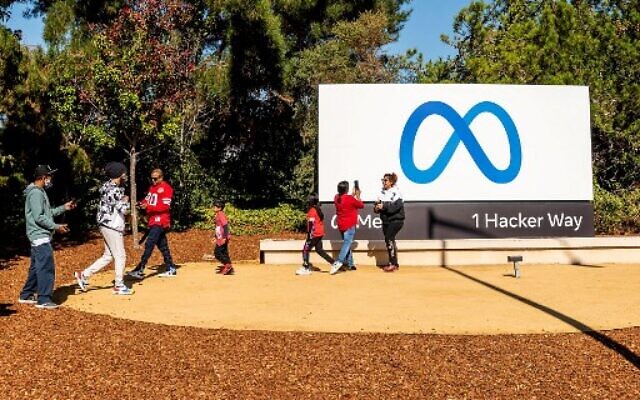
I think that the whole concept of the board, which is really — I call it a regulatory startup — it’s really a very brave experiment and a very important concept of self-regulation that understands, first of all, that Meta, in the Silicon Valley, can be the most wonderful hub of the most gifted people. But it will never hear the voices of the entire globe. It will never be diverse enough. And it needs to bring, first of all, diversity into its decision-making. It needs to bring more perspective into its decision-making. And the perspective this is also a very interesting concept are not just about being people from around the world.
Right, the board, if you look at the people involved in it, it’s like a Benetton ad. The members are from every different country, every different color.
Yes, but more important in my opinion, than being from all those countries countries, cultures, languages. It’s professional diversity because it is called in some places the Supreme Court of Meta. But it’s not just about people with legal backgrounds. You have people like Alan Rusbridger who come from journalism, from being editors in chief of the most important, from The Guardian, one of the most important media groups in the world. People who come from NGOs, people like Nighat Dad from Pakistan and like Julia Owono from Cameroon and France. Or people who come from different systems. It’s people who come from a technological background.
Different religions.
Different religions, absolutely. It’s really interesting to see that when we discuss all types of issues, the way that a person who is an activist talks about it or a person who was a federal judge in the US, like one of our coaches talks about it, it’s different. You allow yourself to say other things, to think differently and it really makes another way of decision-making.
How do you discuss? Are you all on Zoom together?
Yeah, it’s a very interesting system because we started off just when the COVID pandemic started. We were supposed to meet in New York and it was canceled and we realized that we are going to be trained on Zoom. First of all, we went through a very thorough training which took about six months. So we learned a lot on Zoom.
First of all, we learned how to express ourselves through Zoom and to learn to trust each other because it’s really also a matter of understanding who you’re working with and how you feel comfortable enough to express yourself, to disagree.
Chemistry.
Right, chemistry. And we ended up working in panels of five. On those panels you always have one of our co-chairs and you have someone who is a representative of the area where the case is coming from. But we are always being supported by a lot of professionals and all kind of institutions who help us with learning about when we’re talking about where the case is coming from, about the politics of that area, the democracy standards of that area, linguistic issues, historical issues, all kinds of things that helps us to try and understand the content text of the materials that we are receiving.
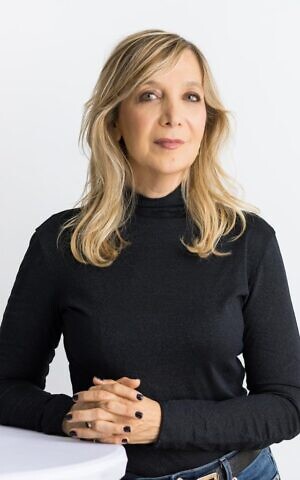
So let’s take a specific case. I don’t know if you worked on this one. The photos of trans and nonbinary individuals, nude photos — or photos that the nipples were covered, I believe is what happened. And initially, they were taken down because of, I think the idea that this couple was crowdfunding to have top surgery which some trans people have in order to feel more comfortable in their skin. And so it was taken down because it was under the category of, I believe, sex work initially. But this case came to the oversight board. Did you work on this case?
We’re never supposed to say if we work on a specific case or not.
Okay, so in this case, who would have been brought in to give advice?
First of all, I think that one of the most important things we’d like the public to know is that there is a public comment process. First of all, when we choose a case, we publish the case on social media and also on our website and we invite the public to give comments, to give perspectives. And it’s very interesting. Sometimes it’s private people, sometimes it’s NGOs, it’s all kinds of people who do advocacy for those issues and they bring a lot of knowledge. Another thing that we do, we have meetings with stakeholders around all kind of issues when we’re trying to learn more. And the last thing is what I started with before, which is receiving all kinds of materials that we are gathering from all types of institutions that we’re working with in order to understand the background, the history, the terms.
So briefs are prepared for you.
Yes, but a lot of professional work is being given. I mean, the administration of the oversight board, sometimes people don’t know how to conceive what is that board. It is a separate company that has a lot of staff that helps us with all kinds of issues.
While it was founded and funded by Meta, of course, it’s a blind trust, correct?
Right, it’s a trust. There was an initial trust that started the work, it was $130,000,000. The trust was renewed. I mean, there was another very large amount of money that was given to the board last summer. It is ruled by a group of trustees and we have a charter.
It’s built in a way that is transparent and also we have our independence. It’s important to say that, to the best of my knowledge, for all of us it’s a part-time occupation. We don’t depend on the board for our livelihoods. I mean, we get paid, but…
Sure, your time is important and it sounds like it’s at least 15 hours a week.
It is supposed to be 15 hours a week. Sometimes we work on PAOs, and it’s more complex, and we need to put more time. But basically, it is a place that ensures our independence. And I must say about myself coming after 24 years working as a civil servant, I don’t remember myself as free to criticize, to say what I think, to be interviewed about my criticism in Israel, for example, as I felt ever since I’m on the board.
So we’re both trying to be transparent — we’re trying to express our independence in every possible way — and you can tell if you follow closely that many of our decisions and recommendations are not convenient to Meta, and they pose a lot of difficulties in terms of implementation, in terms of investment that they have to do in order to implement what we’re doing. We also have the privilege of asking Meta questions and receiving or not receiving answers and being transparent to the public whether Meta answered our questions. It was very important, for example, on the Trump decision, which was one of the first decisions.
Right, let’s talk about this.
Yeah. And we were very transparent about the questions we asked, the ones that were answered and the ones that were not. And if you do the follow-up on those issues, you understand how this is supposed to really change Meta. And I think that it does change it for the better.

So the Trump case we’re talking about is, of course, from my understanding, after the January 6 riots, Trump was barred from Facebook, also from Twitter. He, of course, went back to Twitter earlier, but he was barred from Facebook. And where does the board play a role here?
Look, this was a very interesting case. First of all, it happened really quickly. I mean, we just started working and it came up. I don’t know if you remember the term, but he was barred “indefinitely,” which, when you translate it to Hebrew, you think that it’s for good.
Right, well even in English.
And also in English, you can think that it’s for good. But what it meant was that it was in a non-defined way until we understand what happened here, because we didn’t really have this type of tool when this happened. And first of all, what was very unusual about this case that it wasn’t about a user that is appealing. Usually, we receive cases only if a user is appealing. It was something that Facebook sent us and asked our guidance after they just did the initial thing.
What we found out was that it was — speaking of judicial overhaul, and issues of the rule of law — “indefinitely” wasn’t in the rulebook of Meta. They used a sanction that did not exist. They invented that sanction for someone who was at the time one of the most influential users on the platform. So I think that even just revealing the fact that they were capable of doing something that was not allowed by their own rulebook was super important and also sending it back to them and telling them, “We are not going to solve this problem for you. You have to look at your rules and find an adequate solution to this.”
You have to decide in this case according to your rules. If you want, you are welcome to rewrite your rules in order to be able in the future to put that kind of sanction on a user.
That was only one thing. There were many others and I think that it’s an important decision that is worth reading for everyone who is concerned with democracy and the rule of law and the rule of social media and responsibilities. I think that this is one of the most important things to understand that the oversight board is one expression of the fact that although it’s a technology company, it has responsibilities in terms of human rights. And the UN’s guiding principles for businesses are part of the concept that many users don’t understand: nowadays a company like Meta is an entity that has responsibilities that can be compared to the responsibilities of a state.
They’ve staked their claim on the territory. The Metaverse of course. But it’s fascinating what you’re saying. Just to put it into my own words: Essentially Facebook is beyond the regulations of a company because it is a global entity that goes beyond borders and there’s such a thing as international human rights. And your board, it sounds like, is trying to protect these and discuss them at least.
Also, Meta is committed to protecting human rights and I think that the board is the one that is translating these commitments into the everyday monitoring of content on the platform and it’s very difficult. It’s not a simple mission. And this is why I think that we have this mixture of people who are, I said we’re not only people with legal background, but yes, we have some law professors from the most important universities that are capable of also giving us those basic tools to analyze how the decisions and the community standards are being aligned with human rights standards and commitments.
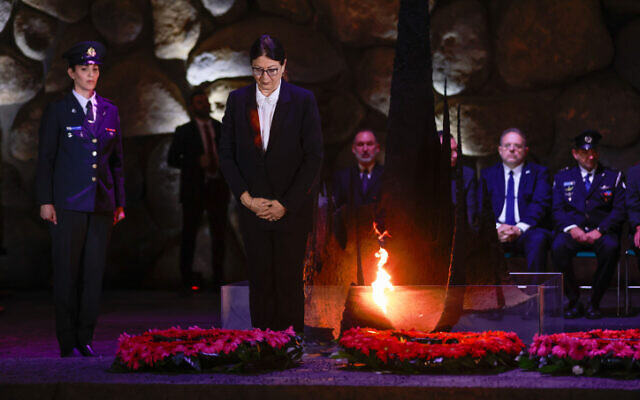
Really fascinating. I’m keeping you for way too long but before we end, I would like to touch on at least Yom Hashoah, the Holocaust Remembrance Day and the upcoming Yom Hazikaron, our Memorial Day. Your name in fact is a testament to your heritage. Can you tell our listeners why?
Yes, I am, I think, a typical second generation. Both my parents went through the Holocaust. My mother was in a concentration camp in Ukraine called Transnistria. My father was in another part of Romania. He was just being persecuted and running away from one place to another, and he was not transported. And my name is actually the initials of the names of my grandmother and great-grandmother, Esther and Machle, which is Michal. So they took E from Esther and Mi from Michal and Emi. And I’m 56 years old, and I think ever since I’m three years old, I’m explaining to the world what this name means. It’s not Amy. People sometimes think that I’m American and it’s Amy or Amelia or something. It’s Emi like the prize. And it’s also after my grandmothers.
How has this heritage influenced your work?
Everything in my work, I think, is influenced by that. Also, my parents were persecuted after they came back. They were persecuted by the Communist regime in Romania. And I think that my notion at home of what it is to be in Israel means that, first of all, it’s the legacy of being Jewish and understanding our history and the way that we need to have a country. But the democratic part is the remembrance of what it means to be a minority and what it is to be persecuted on the basis of race.
And much of my work that had to do with the eradication of racism and the protection of the rights of minorities and the advancement of minorities, for example, within the government, has to do with me looking at my parents and knowing what it means. My father was thrown from university for being a Zionist, for being Jewish, and for being a Zionist in the 1950s in Romania, and they’ve experienced antisemitism in so many ways. And I can also tell you my father was a diplomat, so I traveled with them around the world, and I had my own experiences of antisemitism as a child. I always called that positive antisemitism in terms that I was receiving many compliments, that I don’t look Jewish, I don’t act Jewish, and so forth. It takes you a while to understand as a child that this is not really a compliment. So I have this awareness, really, from the very basic everyday life of my parents and my childhood and the way I was raised.
Before we turn to Yom Hazikaron, just briefly, tell us about the Palmor Report, which ties in here.
The Palmor Report is a report that was given to the government after the protests of the Ethiopian community in Israel that dealt with policing, that dealt with all types of discrimination and with a demand to try to find out whether there is institutional racism against Israelis of Ethiopian descent.
It was an ultrasensitive issue. It was very difficult to decide to establish that committee, and I’m very proud of that report. That, by the way, there’s now a case study in Harvard that was written by Professor Robert Livingstone in the Kennedy School.
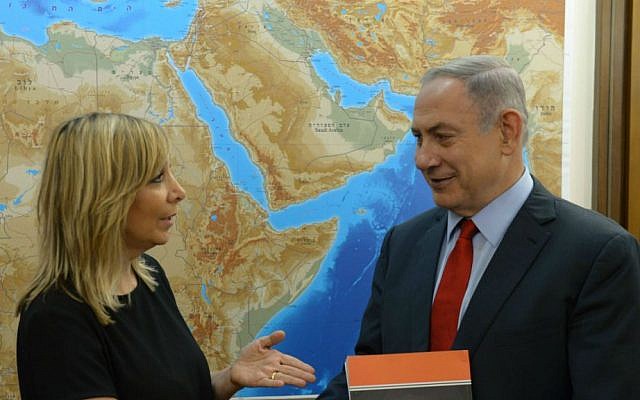
It gave 53 recommendations — almost all of them were fully implemented by the government. And first of all, it acknowledged the fact that there is institutional racism in Israel against Israelis of Ethiopian descent. But it gave practical recommendations to the police, to the judicial system, to the educational system, and others, Ministry of Health, for example, how to change that, and how to create an infrastructure that will ensure that those things will not continue to happen.
Of course they do continue, but, for example, in terms of policing, there is huge progress within the Israeli police. I’m extremely proud that three years after the report was given to the government, there was already a decline of 50 percent in the arrests of minors of Ethiopian descent, decline of tens of percentages with the incarceration of minors of Ethiopian descent.
And this is really huge. And this is really, I think it’s my work that I’m most proud of and that is still living. I mean, the Supreme Court and other courts in Israel are quoting this report and leaning on its data and on its conclusions in many of their decisions. So it’s being taught in universities. It really has an impact on everyday life in Israel.
Quite the legacy for the public sector. Now, let’s talk about your volunteer work, which ties into Memorial Day.
All right. I am a very proud chair of an NGO called Natal. Natal is an NGO that was established 25 years ago by Judith Yovel Recanati in order to address PTSD of victims of war and terror, veterans, of course, and citizens who are experiencing terror in Israel.
It started with establishing very special helplines that are not just about, okay, you have someone that you can call, but also they know how to create a regular relationship between the volunteers and the helpline and the professionals at the helpline with people who need that type of help. It gives clinical help for free to people who need it. And many, many years before the Ministry of Defense tried to improve its treatment of our veterans suffering from PTSD, and not truly understanding what we call the invisible wounds, because when somebody has lost his hand, you can tell that he lost his hand. But when somebody suffers from PTSD, most of the time, and for many, many years, especially after the Yom Kippur War, people were ashamed to say that they were suffering. I mean, it was just against the macho heritage of what it means to be a soldier in Israel.
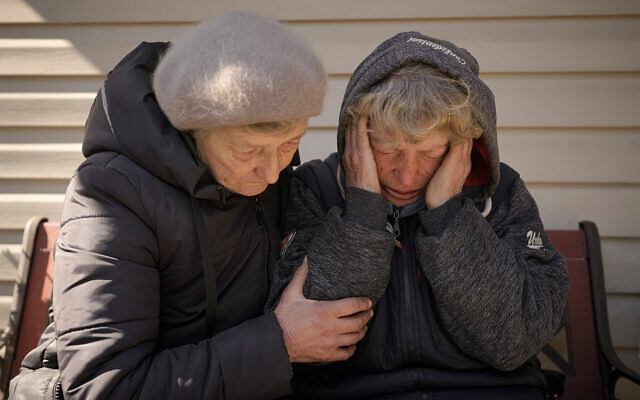
So it’s truly very important work. And I think that I had a very unusual experience when Natal was honored to be chosen by Michal Herzog, our President Isaac Herzog’s wife and Olena Zelenska, [Ukrainian President Volodymyr] Zelensky’s wife, to train professionals from Ukraine who came here in July in order to try and think how to support their people going through such a terrible war and give them the mental healing that they need and the mental support that they need.
It was funded by the way, by very generous donations from North America and several foundations. But I think that our possibility of taking our own pain and the knowledge that we developed on how to treat, how to heal, how to prevent damages, and to give it to the world, even to the Ukrainian war, where my own mother was in a concentration camp — it is really an unbelievable Jewish story, an Israeli story that is worth telling. And we’re giving this help also to other communities in North America and around the world.
We can’t end the podcast episode just before Independence Day, the 75th Independence Day like this, though everything has been very important. I would just like to hear from you a little bit more about your optimism that we are at a moment that will make us into a stronger Israel.
It almost makes me want to cry. Yesterday, I was standing in Natal’s office in Tel Aviv when the siren of Holocaust Day was going on, and I was just looking outside the windows. I mean, many members of my mother’s and father’s families were murdered during the Holocaust.
But I looked around and I said, wow, this country is so beautiful. And it’s unbelievable that I have the privilege of living here, surrounded by my own people, with a lot of unbelievable achievements of the State of Israel and an unbelievable security to my children that they cannot even imagine. I mean, it’s within our lifetime that they have known their grandparents, who were persecuted as children, who never had, not the childhood, not the adolescence, and not even the years in the university that my children are experiencing.

So it’s a miracle. It’s a miracle. And I am very grateful to my parents that they made that choice and arrived here. I would never choose any other place, no matter what. And even in these days of this judicial overhaul, I see the flags during the protests, and I love our flag, and it really brings me a lot of pride and a lot of hope.
Emi, thank you so much.
What Matters Now podcasts are available for download on iTunes, TuneIn, Pocket Casts, Stitcher, PlayerFM or wherever you get your podcasts.
Check out last week’s What Matters Now
There's no paywall on The Times of Israel, but the journalism we do is costly. As an independent news organization, we are in no way influenced by political or business interests. We rely on readers like you to support our fact-based coverage of Israel and the Jewish world. If you appreciate the integrity of this type of journalism, please join the ToI Community.

We’re really pleased that you’ve read X Times of Israel articles in the past month.
That’s why we started the Times of Israel eleven years ago - to provide discerning readers like you with must-read coverage of Israel and the Jewish world.
So now we have a request. Unlike other news outlets, we haven’t put up a paywall. But as the journalism we do is costly, we invite readers for whom The Times of Israel has become important to help support our work by joining The Times of Israel Community.
For as little as $6 a month you can help support our quality journalism while enjoying The Times of Israel AD-FREE, as well as accessing exclusive content available only to Times of Israel Community members.
Thank you,
David Horovitz, Founding Editor of The Times of Israel








